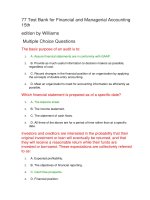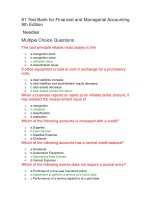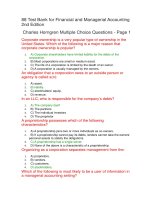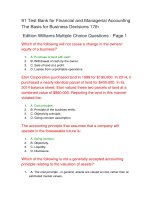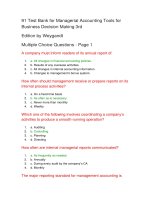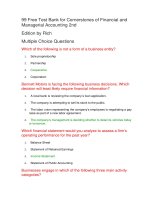91 test bank for financial and managerial accounting the basis for business decisions 17th
Bạn đang xem bản rút gọn của tài liệu. Xem và tải ngay bản đầy đủ của tài liệu tại đây (59.34 KB, 19 trang )
91 Test Bank for Financial and Managerial Accounting
The Basis for Business Decisions 17th
Edition Williams
Multiple Choice Questions - Page 1
The amount of owners' equity in a business is not affected by:
1.
2.
3.
4.
A. The percentage of total assets held in cash.
B. The investments made in the business by the owner.
C. The profitability of the business.
D. The amount of dividends paid to stockholders.
Which of the following best defines an asset?
1.
A. Something with physical form that is valued at cost in the accounting
records.
2. B. An economic resource owned by a business and expected to benefit future
operations.
3. C. An economic resource representing cash or the right to receive cash in the
near future.
4. D. Something owned by a business that has a ready market value.
Which of the following is correct when a corporation uses cash to
pay for an expense?
1.
2.
3.
4.
A. Total assets will decrease.
B. Retained earnings will increase.
C. Owners' equity will increase.
D. Liabilities will increase.
A payment of a business debt not including interest:
1.
2.
3.
4.
A. Decreases total assets.
B. Increases total liabilities.
C. Increases the owners' equity in the business.
D. Decreases the owners' equity in the business.
Which of the following assets would most likely be listed last on a
statement of financial position?
1.
2.
3.
4.
A. Land.
B. Cash.
C. Accounts receivable.
D. Equipment.
On the statement of financial position, assets are normally
presented in and liabilities are usually presented in:
1.
2.
3.
4.
A. Their order of permanence; the order in which they become due.
B. The order in which they become due; their order of permanence.
C. Order of profitability; order of liquidity.
D. Order of liquidity; order of profitability.
Deerpark Corporation recently borrowed $70,000 cash from its
bank. Which of the following was unaffected by this transaction?
1.
2.
3.
4.
A. Assets.
B. Liabilities.
C. Owners' equity.
D. Cash.
Which of the following liabilities would most likely be listed last on a
statement of financial position?
1.
2.
3.
4.
A. Bonds payable, due in 20 years.
B. Accounts payable.
C. Note payable, due in 3 years.
D. Income taxes payable.
Which of the following transactions would cause a change in
owners' equity?
1.
2.
3.
4.
A. Repayment of the principal on a bank loan.
B. Purchase of a delivery truck on credit.
C. Sale of land on credit for a price above cost.
D. Borrowing money from a bank.
If a transaction causes an asset account to decrease, which of the
following related effects may occur?
1.
2.
3.
4.
A. An increase of equal amount in an owners' equity account.
B. An increase in a liability account.
C. An increase of equal amount in another asset account.
D. An increase in the combined total of liabilities and owners' equity.
Each year, the accountant for Southern Real Estate Company
adjusts the recorded value of each asset to its market value. Using
these market value figures on the balance sheet violates:
1.
2.
3.
4.
A. The accounting equation.
B. The stable-dollar assumption.
C. The business entity concept.
D. The cost principle.
If total assets equal $345,000 and total owners' equity equal
$120,000, then total liabilities must equal:
1.
A. $465,000.
2.
3.
4.
B. $225,000.
C. $120,000.
D. Cannot be determined from the information given.
From an accounting viewpoint, when is a business considered as
an entity separate from its owner(s)?
1.
2.
3.
4.
A. Only when organized as a sole proprietorship.
B. Only when organized as a partnership.
C. Only when organized as a corporation.
D. A business is always considered as an accounting entity separate from the
activities of the owner(s).
Which of the following transactions would cause an increase in both
assets and owners' equity?
1.
2.
3.
4.
A. Investment of cash in the business by the owner.
B. Sale of land for a price less than its cost.
C. Borrowing money from a bank.
D. Sale of land for cash at a price equal to its cost.
Which of the following is not a generally accepted accounting
principle relating to the valuation of assets?
1.
A. The cost principle - in general, assets are valued at cost, rather than at
estimated market values.
2. B. The objectivity principle - accountants prefer to use objective, rather than
subjective, information as the basis for accounting information.
3. C. The safety principle - assets are valued at no more than the value for which
they are insured.
4. D. The going-concern assumption - one reason for valuing assets such as
buildings and equipment at cost rather than at their current market values is the
assumption that the business will use these assets rather than sell them.
Which of the following is the primary objective of an income
statement?
1.
A. Providing managers with detailed information about where the enterprise
stands at a specific date.
2. B. Providing users outside the business organization with information about
the company's financial position and operating results.
3. C. Reporting to the Internal Revenue Service the company's taxable income.
4. D. Indicating to investors in a particular company the current market values of
their investments.
A transaction caused an increase in both assets and owners' equity.
This transaction could have been resulted from the:
1.
2.
A. Sale of services to a customer.
B. Sale of land for a price less than its cost.
3.
4.
C. Borrowing money from a bank.
D. Sale of land for cash at a price equal to its cost.
Which of the following describes the proper form of a balance
sheet?
1.
2.
A. The heading sets forth the period of time covered.
B. Cash is always the first asset listed, followed by permanent assets (such as
land and buildings), and finally by assets such as receivables and supplies.
3. C. Liabilities are listed before owners' equity.
4. D. A subtotal for total assets plus total liabilities is shown.
Eton Corporation purchased land in 1998 for $190,000. In 2014, it
purchased a nearly identical parcel of land for $430,000. In its 2014
balance sheet, Eton valued these two parcels of land at a combined
value of $860,000. Reporting the land in this manner violated the:
1.
2.
3.
4.
A. Cost principle.
B. Principle of the business entity.
C. Objectivity principle.
D. Going-concern assumption.
The owner of Westhampton Fish Eatery purchased a new car for
his daughter who is away at college at a cost of $43,000 and
reported this amount as Delivery Vehicle in the restaurant's balance
sheet. The reporting of this item in this manner violated the:
1.
2.
3.
4.
A. Cost principle.
B. Business entity concept.
C. Objectivity principle.
D. Going-concern assumption.
If total assets equal $270,000 and total liabilities equal $202,500,
the total owners' equity must equal:
1.
2.
3.
4.
A. $472,500.
B. $67,500.
C. $270,000.
D. Cannot be determined from the information given.
The accounting principle that assumes that a company will operate
in the foreseeable future is:
1.
2.
3.
4.
A. Going concern.
B. Objectivity.
C. Liquidity.
D. Disclosure.
Blue Wholesale Shirt Co. sold shirts to Pink Retail Shoppe. The
owner of Pink Retail said she would pay Blue at a later date, which
Blue Wholesale agreed to. Blue Wholesale Shirt Co. is considered
to be a:
1.
2.
3.
4.
A. borrower.
B. liability.
C. creditor.
D. debtor.
Which of the following will not cause a change in the owners' equity
of a business?
1.
2.
3.
4.
A. Purchase of land with cash.
B. Withdrawal of cash by the owner.
C. Sale of land at a profit.
D. Losses from unprofitable operations.
The valuation of assets in the balance sheet is based primarily
upon:
1.
2.
3.
4.
A. What it would cost to replace the assets.
B. Cost, because cost is usually factual and verifiable.
C. Current fair market value as established by independent appraisers.
D. Cost, because in the event of liquidation, the assets would be sold at an
amount equal to their original cost.
Bob Bertolucci, owner of Bob's Bazaar, also owns a personal
residence that costs $575,000. The market value of his residence is
$725,000. During preparation of the financial statements for Bob's
Bazaar, the accounting principle most relevant to the presentation
of Bob's home is:
1.
2.
3.
4.
A. The concept of the business entity.
B. The cost principle.
C. The going-concern assumption.
D. The objectivity principle.
Decreases in owners' equity are caused by:
1.
2.
3.
4.
A. Purchases of assets and payment of liabilities.
B. Purchases of assets and incurrence of liabilities.
C. Payment of liabilities and unprofitable operations.
D. Distributions of assets to the owners and unprofitable operations.
A balance sheet is designed to show:
1.
2.
3.
A. How much a business is worth.
B. The profitability of the business during the current year.
C. The assets, liabilities, and owners' equity of a business as of a particular
date.
4.
D. The cost of replacing the assets and of paying off the liabilities at
December 31.
91 Free Test Bank for Financial and Managerial
Accounting The Basis for Business Decisions 17th
Edition Williams Multiple Choice Questions - Page 2
At December 31, 2014, Accounts payable: $16,000; Land:
$240,000; Capital: ? Building: $180,000, Retained Earnings:
$160,000; Accounts receivable: $40,000; Cash: ?; Equipment:
$120,000; Notes payable: $190,000. If Capital Stock is $320,000,
total assets of Braun Corporation at December 31, 2014, amounts
to:
1.
2.
3.
4.
A. $686,000.
B. $926,000.
C. $726,000.
D. $106,000.
At December 31, 2014, Accounts payable: $16,000; Land:
$240,000; Capital: ? Building: $180,000, Retained Earnings:
$160,000; Accounts receivable: $40,000; Cash: ?; Equipment:
$120,000; Notes payable: $190,000. If Capital Stock is $260,000,
what is the December 31, 2014 cash balance?
1.
2.
3.
4.
A. $86,000.
B. $94,000.
C. $46,000.
D. $686,000.
At December 31, 2014, Accounts payable: $2,500; Land: $30,000;
Building: $31,250; Notes payable:?; Retained Earnings: $125,000;
Accounts receivable: $18,750; Cash:?; Equipment: $40,000; Capital
stock: $12,500. If the Notes Payable is $10,000, the December 31,
2014 cash balance is:
1.
2.
3.
4.
A. $60,000.
B. $160,000.
C. $30,000.
D. $20,000.
Owners' equity in a business decreases as a result of which of the
following?
1.
2.
3.
A. Investments of cash by the owners.
B. Profits from operating the business.
C. Losses from unprofitable operation of the business.
4.
D. Repaying a loan to a commercial bank.
At December 31, 2014,Accounts payable: $12,000; Land: $90,000;
Building: $250,000; Notes payable $135,000; Retained Earnings:?;
Accounts receivable: $30,000; Cash: $7,000; Equipment:?; Capital
stock: $188,000. If Retained Earnings at December 31, 2014, is
$100,000, Equipment is carried in Hercules Manufacturing, Inc.
accounting records at:
1.
2.
3.
4.
A. $42,000.
B. $58,000.
C. $43,500.
D. $345,000.
To appear in a balance sheet of a business entity, an asset need
not:
1.
2.
3.
4.
A. Be an economic resource.
B. Have a ready market value.
C. Be expected to benefit future operations.
D. Be owned by the business.
Retained earnings appears on:
1.
2.
3.
4.
A. The income statement.
B. The balance sheet.
C. The statement of cash flows.
D. All three of the financial statements.
If a company purchases equipment for $65,000 by issuing a note
payable:
1.
2.
3.
4.
A. Total assets will increase by $65,000.
B. Total assets will decrease by $65,000.
C. Total assets will remain the same.
D. The company's total owners' equity will decrease.
At December 31, 2014, Accounts payable: $2,500; Land: $30,000;
Building: $31,250; Notes payable:?; Retained Earnings: $125,000;
Accounts receivable: $18,750; Cash:?; Equipment: $40,000; Capital
stock: $12,500. If the Cash balance at December 31, 2014 is
$62,500 then Total Liabilities amounts to:
1.
2.
3.
4.
A. $42,500.
B. $140,000.
C. $45,000.
D. $182,500.
A balance sheet:
1.
A. Provides owners, investors, and other interested parties with all the
financial information they need to evaluate the financial strength, profitability,
and future prospects of a given business entity.
2. B. Shows the current market value of the owners' equity in the business at the
balance sheet date.
3. C. Assists creditors in evaluating the debt-paying ability of a business by
showing the assets and liabilities of the business combined with those of its
owner (or owners).
4. D. Shows the assets, liabilities, and owners' equity of a business entity, valued
in conformity with generally accepted accounting principles.
At December 31, 2014, Accounts payable: $2,500; Land: $30,000;
Building: $31,250; Notes payable:?; Retained Earnings: $125,000;
Accounts receivable: $18,750; Cash:?; Equipment: $40,000; Capital
stock: $12,500. If the Cash balance at December 31, 2014 is
$67,500, the Notes Payable balance is:
1.
2.
3.
4.
A. $118,750.
B. $47,500.
C. $137,500.
D. $140,000.
Owners' equity in a business increases as a result of which of the
following?
1.
2.
3.
4.
A. Payments of cash to the owners.
B. Losses from unprofitable operation of the business.
C. Earnings from profitable operation of the business.
D. Borrowing from a commercial bank.
At December 31, 2014, Accounts payable: $16,000; Land:
$240,000; Capital: ? Building: $180,000, Retained Earnings:
$160,000; Accounts receivable: $40,000; Cash: ?; Equipment:
$120,000; Notes payable: $190,000. If Cash at December 31, 2014,
is $26,000, total owners' equity is:
1.
2.
3.
4.
A. $160,000.
B. $366,000.
C. $606,000.
D. $400,000.
The balance sheet item that represents the portion of owners'
equity resulting from profitable operations of the business is:
1.
2.
3.
4.
A. Accounts receivable.
B. Cash.
C. Capital stock.
D. Retained earnings.
During the current year, the assets of Wheatley's increased by
$362,000, and the liabilities increased by $260,000. The owners'
equity in the business must have:
1.
2.
3.
4.
A. Decreased by $102,000.
B. Decreased by $622,000.
C. Increased by $102,000.
D. Increased by $622,000.
Capital stock represents:
1.
A. The amount invested in the business by stockholders when shares of stock
were initially issued by a corporation.
2. B. The owners' equity for a business organized as a corporation.
3. C. The owners' equity accumulated through profitable operations that have
not been paid out as dividends.
4. D. The price paid by the current owners to acquire shares of stock in the
corporation, regardless of whether they bought the shares directly from the
corporation or from another stockholder.
At December 31, 2014, Accounts payable: $16,000; Land:
$240,000; Capital: ? Building: $180,000, Retained Earnings:
$160,000; Accounts receivable: $40,000; Cash: ?; Equipment:
$120,000; Notes payable: $190,000. If Cash at December 31, 2014,
is $66,000, total assets amounts to:
1.
2.
3.
4.
A. $606,000.
B. $806,000.
C. $662,000.
D. $646,000.
Which of the following is correct if a company purchases equipment
for $70,000 cash?
1.
2.
3.
4.
A. Total assets will increase by $70,000.
B. Total assets will decrease by $70,000.
C. Total assets will remain the same.
D. The company's total owners' equity will decrease.
At December 31, 2014, Accounts payable: $16,000; Land:
$240,000; Capital: ? Building: $180,000, Retained Earnings:
$160,000; Accounts receivable: $40,000; Cash: ?; Equipment:
$120,000; Notes payable: $190,000. If Cash at December 31, 2014,
is $86,000, Capital Stock is:
1.
2.
3.
A. $260,000.
B. $300,000.
C. $620,000.
4.
D. $168,000.
Which of the following is correct if at the end of Crystal Imports' first
year of operations, Assets are $800,000 and Owners' Equity is
$720,000?
1.
2.
3.
4.
A. The owner(s) must have invested $800,000 to start the business.
B. The business must be operating profitably.
C. Liabilities are $80,000.
D. Liabilities are $1,520,000.
At December 31, 2014,Accounts payable: $12,000; Land: $90,000;
Building: $250,000; Notes payable $135,000; Retained Earnings:?;
Accounts receivable: $30,000; Cash: $7,000; Equipment:?; Capital
stock: $188,000. If total assets of Hercules Manufacturing, Inc. are
$556,000, Equipment is carried in Hercules Manufacturing
accounting records at:
1.
2.
3.
4.
A. $377,000.
B. $179,000.
C. $150,000.
D. $90,000.
If a company has a profit:
1.
2.
3.
4.
A. Assets will be equal to liabilities plus owners' equity.
B. Assets will be less than liabilities plus owners' equity.
C. Assets will be greater than liabilities plus owners' equity.
D. Owners' equity will be greater than its assets.
At December 31, 2014,Accounts payable: $12,000; Land: $90,000;
Building: $250,000; Notes payable $135,000; Retained Earnings:?;
Accounts receivable: $30,000; Cash: $7,000; Equipment:?; Capital
stock: $188,000. If total assets of Hercules Manufacturing, Inc. are
$556,000, Retained Earnings at December 31, 2014, must be:
1.
2.
3.
4.
A. $811,000.
B. $180,000.
C. $221,000.
D. $335,000.
At December 31, 2014,Accounts payable: $12,000; Land: $90,000;
Building: $250,000; Notes payable $135,000; Retained Earnings:?;
Accounts receivable: $30,000; Cash: $7,000; Equipment:?; Capital
stock: $188,000. Assume that the Equipment shown above was
acquired by the business five years ago and has a book value of
$156,000, but has a current appraised value of $200,000. Hercules
Manufacturing's Retained Earnings at December 31, 2014,
amounts to:
1.
2.
3.
4.
A. $533,000.
B. $345,000.
C. $198,000.
D. $356,000.
At December 31, 2014,Accounts payable: $12,000; Land: $90,000;
Building: $250,000; Notes payable $135,000; Retained Earnings:?;
Accounts receivable: $30,000; Cash: $7,000; Equipment:?; Capital
stock: $188,000. If Retained Earnings at December 31, 2014, is
$140,000, total assets amounts to:
1.
2.
3.
4.
A. $98,000.
B. $377,000.
C. $475,000.
D. $188,000.
At December 31, 2014, Accounts payable: $2,500; Land: $30,000;
Building: $31,250; Notes payable:?; Retained Earnings: $125,000;
Accounts receivable: $18,750; Cash:?; Equipment: $40,000; Capital
stock: $12,500. If the Notes Payable balance is $25,000, then the
total assets of Gordon, Inc. at December 31, 2014 amount to:
1.
2.
3.
4.
A. $27,500.
B. $152,500.
C. $120,000.
D. $165,000.
91 Free Test Bank for Financial and Managerial
Accounting The Basis for Business Decisions 17th
Edition Williams Multiple Choice Questions - Page 3
Waldorf Co. had the following transactions during the month of
October 2014: Cash received from bank loans was $60,000;
Dividends of $18,500 were paid to stockholders in cash; Revenues
earned and received in cash amounted to $100,500; Expenses
incurred and paid were $78,000. At the beginning of October,
owners' equity in Waldorf was $480,000. Given the transactions of
October, 2014, what will be the owners' equity at the end of the
month?
1.
2.
A. $480,000.
B. $484,000.
3.
4.
C. $502,500.
D. $580,500.
A revenue transaction will result in all of the following except:
1.
2.
3.
4.
A. An increase in assets.
B. An increase in owners' equity.
C. A positive cash flow in either the past, present, or future.
D. An increase in liabilities.
Thirty percent of the total assets of Shanahan Corporation have
been financed through borrowing. The total liabilities of the
company are $600,000. What is the amount of owners' equity?
1.
2.
3.
4.
A. $180,000.
B. $2,000,000.
C. $1,400,000.
D. $2,600,000.
The way in which financial statements relate is known as:
1.
2.
3.
4.
A. Solvency.
B. Objectivity.
C. Articulation.
D. Entity.
Which of the following activities is not a category into which cash
flows are classified?
1.
2.
3.
4.
A. Marketing activities.
B. Operating activities.
C. Financing activities.
D. Investing activities.
Which of the following statements regarding liquidity and profitability
is not true?
1.
A. If a business is unable to pay its debts as they come due, it is operating
unprofitably.
2. B. A business may be liquid, yet operate unprofitably for several years.
3. C. A business may operate profitably, yet be unable to meet its obligations.
4. D. In order to survive in the long-run, a business must both remain liquid and
operate profitably.
Astoria Co. had the following transactions during the month of
August 2014: Cash received from bank loans was $20,000;
Dividends of $9,500 were paid to stockholders in cash; Revenues
earned and received in cash amounted to $33,500; Expenses
incurred and paid were $26,000. What amount of net income will be
reported on an income statement for the month of August?
1.
2.
3.
4.
A. $20,000.
B. $7,500.
C. $0.
D. $33,500.
The total liabilities of Hogan's Company on the balance sheet are
$270,000; this amount is equal to three-fourths of the total assets.
What is the amount of owners' equity?
1.
2.
3.
4.
A. $202,500.
B. $90,000.
C. $360,000.
D. $630,000.
During the month of August, Boyce Company had the following
transactions: Revenues of $120,000 were earned and received in
cash; Bank loans of $18,000 were paid off; Equipment of $40,000
was purchased with cash; Expenses of $73,600 were paid;
Stockholders purchased additional shares for $44,000 cash. A
statement of cash flows for August, would report net cash flows
from investing activities of:
1.
2.
3.
4.
A. ($26,000).
B. $32,400.
C. ($40,000).
D. $46,400.
A transaction caused a $60,000 increase in both assets and total
liabilities. This transaction could have been which of the following?
1.
2.
A. Purchase for office equipment for $60,000 cash.
B. Purchase of office equipment for $120,000, paying $60,000 cash and
issuing a note payable for the balance.
3. C. Repayment of a $60,000 bank loan.
4. D. Investment of $60,000 cash in the business by the owner.
During the month of August, Boyce Company had the following
transactions: Revenues of $120,000 were earned and received in
cash; Bank loans of $18,000 were paid off; Equipment of $40,000
was purchased with cash; Expenses of $73,600 were paid;
Stockholders purchased additional shares for $44,000 cash. A
statement of cash flows for August, would report an increase in
cash of:
1.
2.
3.
A. $26,000.
B. $32,400.
C. $40,000.
4.
D. $46,400.
Which business organization is recognized as a separate legal
entity under the law?
1.
2.
3.
4.
A. Corporation.
B. Sole proprietorship.
C. Partnership.
D. All business organizations are separate legal entities.
The concept of adequate disclosure means that:
1.
A. The accounting department of a business must inform management of the
accounting principles used in preparing the financial statements.
2. B. The company must inform users of any significant facts necessary for
proper interpretation of the financial statements, including events occurring
after the financial statement date.
3. C. The independent auditors must disclose in the financial statements any and
all errors detected in the company's accounting records.
4. D. The financial statements should include a comprehensive list of each
transaction that occurred during the year.
The principle of adequate disclosure means that a company should
disclose:
1.
2.
3.
A. Only the important monetary information.
B. All confidential information regarding the company.
C. Any financial facts that a reasonably informed person would consider
necessary for the proper interpretation of the financial statements.
4. D. Only subsequent events.
During the month of August, Boyce Company had the following
transactions: Revenues of $120,000 were earned and received in
cash; Bank loans of $18,000 were paid off; Equipment of $40,000
was purchased with cash; Expenses of $73,600 were paid;
Stockholders purchased additional shares for $44,000 cash.A
statement of cash flows for August, would report net cash flows
from financing activities of:
1.
2.
3.
4.
A. $26,000.
B. $32,400.
C. $40,000.
D. $46,400.
If during the current year, liabilities of Hayden Travel decreased by
$50,000 and owners' equity increased by $75,000, then:
1.
2.
3.
A. Assets at the end of the year total $125,000.
B. Assets at the end of the year total $25,000.
C. Assets increased during the year by $25,000.
4.
D. Assets decreased during the year by $125,000.
Which of the following best describes liquidity?
1.
2.
3.
4.
A. The ability to increase the value of retained earnings.
B. The ability to pay the debts of the company as they become due.
C. Being able to buy everything the company requires for cash.
D. Purchasing everything the company requires on credit.
Retained earnings is:
1.
2.
3.
A. The positive cash flows of a company.
B. The net worth of a company.
C. The owners' equity that has accumulated as a result of profitable
operations.
4. D. Equal to the total assets of a company.
If $9,600 cash and a $31,000 note payable are given in exchange
for some office machines to be used in a business:
1.
2.
3.
4.
A. Total assets are increased.
B. Total liabilities are decreased.
C. Total assets are decreased.
D. The owners' equity is increased.
According to the Sarbanes-Oxley Act, CEOs and CFOs must certify
to the accuracy of their company's financial statements:
1.
2.
3.
4.
A. Monthly and Quarterly.
B. Quarterly and Annually.
C. Monthly and Annually.
D. CEOs and CFOs are not required to certify to the company's financial
statement; only CPA's do.
A strong statement of cash flows indicates that significant cash is
being generated by:
1.
2.
3.
4.
A. Operating activities.
B. Financing activities.
C. Investing activities.
D. Effective tax planning.
If during the current year, liabilities of Corbett's Store increased by
$220,000 and owners' equity increased by $160,000, then:
1.
2.
3.
4.
A. Assets at the end of the year total $380,000.
B. Assets at the end of the year total $60,000.
C. Assets increased during the year by $380,000.
D. Assets decreased during the year by $60,000.
During the current year, the assets of Quality Stairs increased by
$175,000 and the liabilities decreased by $15,000. If the owners'
equity in the business is $475,000 at the end of the year, the
owners' equity at the beginning of the year must have been:
1.
2.
3.
4.
A. $335,000.
B. $285,000.
C. $665,000.
D. $615,000.
Waldorf Co. had the following transactions during the month of
October 2014: Cash received from bank loans was $60,000;
Dividends of $18,500 were paid to stockholders in cash; Revenues
earned and received in cash amounted to $100,500; Expenses
incurred and paid were $78,000. For the month of October, net cash
flows from operating activities for Waldorf were:
1.
2.
3.
4.
A. $18,500.
B. $22,500.
C. $78,000.
D. $100,500.
At the end of the current year, the owners' equity in Barclay Bakery
is $246,000. During the year, the assets of the business had
increased by $120,000 and the liabilities had increased by $72,000.
Owners' equity at the beginning of the year must have been:
1.
2.
3.
4.
A. $198,000.
B. $174,000.
C. $284,000.
D. $438,000.
Astoria Co. had the following transactions during the month of
August 2014: Cash received from bank loans was $20,000;
Dividends of $9,500 were paid to stockholders in cash; Revenues
earned and received in cash amounted to $33,500; Expenses
incurred and paid were $26,000. For the month of August, net cash
flows from operating activities for Astoria were:
1.
2.
3.
4.
A. $33,500.
B. $7,500.
C. $20,000.
D. $26,000.
Which one of the following is not considered as one of the three
primary financial statements?
1.
2.
A. Balance sheet.
B. Income statement.
3.
4.
C. Statement of cash flows.
D. Statement of budgeting activities.
At the end of the current year, the owners' equity in Durante Co. is
$360,000. During the year, the assets of the business had
increased by $68,000 and the liabilities had increased by $118,000.
Owners' equity at the beginning of the year must have been:
1.
2.
3.
4.
A. $410,000.
B. $310,000.
C. $546,000.
D. $174,000.
During the month of May, Henderson Company had the following
transactions: Revenues of $60,000 were earned and received in
cash; Bank loans of $9,000 were paid off; Equipment of $20,000
was purchased; Expenses of $36,800 were paid; Stockholders
purchased additional shares for $22,000 cash.A statement of cash
flows for May would report net cash flows from operating activities
of:
1.
2.
3.
4.
A. $60,000.
B. $16,200.
C. $23,200.
D. $20,000.
If cash flows from operating activities is a positive amount, then:
1.
2.
3.
4.
A. The amount will be shown on the statement of cash flows in parentheses.
B. The company must have had a net profit for the year.
C. The company must have paid off more debts than it earned during the year.
D. The company may still have a decrease in the total amount of cash for the
period.
Waldorf Co. had the following transactions during the month of
October 2014: Cash received from bank loans was $60,000;
Dividends of $18,500 were paid to stockholders in cash; Revenues
earned and received in cash amounted to $100,500; Expenses
incurred and paid were $78,000. What amount of net income will be
reported on an income statement for the month of October?
1.
2.
3.
4.
A. $18,500.
B. $22,500.
C. $78,000.
D. $100,500.
The change in owners' equity due to only revenue and expense
transactions is explained by the:
1.
2.
3.
4.
A. Statement of cash flows.
B. Statement of financial position.
C. Income statement.
D. Tax return.
A strong statement of financial position shows:
1.
A. Large amounts of liquid assets relative to the liabilities due in the near
future.
2. B. Large amounts of debt relative to stockholders' equity.
3. C. That cash is being generated by operations.
4. D. That profits are being generated by operations.
Astoria Co. had the following transactions during the month of
August 2014: Cash received from bank loans was $20,000;
Dividends of $9,500 were paid to stockholders in cash; Revenues
earned and received in cash amounted to $33,500; Expenses
incurred and paid were $26,000. At the beginning of August, 2014,
owners' equity in Astoria was $160,000. Given the transactions of
August, what will be the owners' equity be at the end of the month?
1.
2.
3.
4.
A. $167,500.
B. $150,500.
C. $193,500.
D. $158,000.
During the month of August, Boyce Company had the following
transactions: Revenues of $120,000 were earned and received in
cash; Bank loans of $18,000 were paid off; Equipment of $40,000
was purchased with cash; Expenses of $73,600 were paid;
Stockholders purchased additional shares for $44,000 cash. A
statement of cash flows for August, would report net cash flows
from operating activities of:
1.
2.
3.
4.
A. $26,000.
B. $32,400.
C. $40,000.
D. $46,400.
An expense is best defined as:
1.
2.
3.
4.
A. Any payment of cash for the benefit of the company.
B. Past, present, or future payments of cash required to generate revenues.
C. Past payments of cash required to generate revenues.
D. Future payments of cash required to generate revenues.
Profitability may be defined as:
1.
A. The ability to pay the debts of the company as they become due.
2.
3.
4.
B. The ability to increase retained earnings.
C. Distributing dividends out of retained earnings.
D. Having excess cash.

